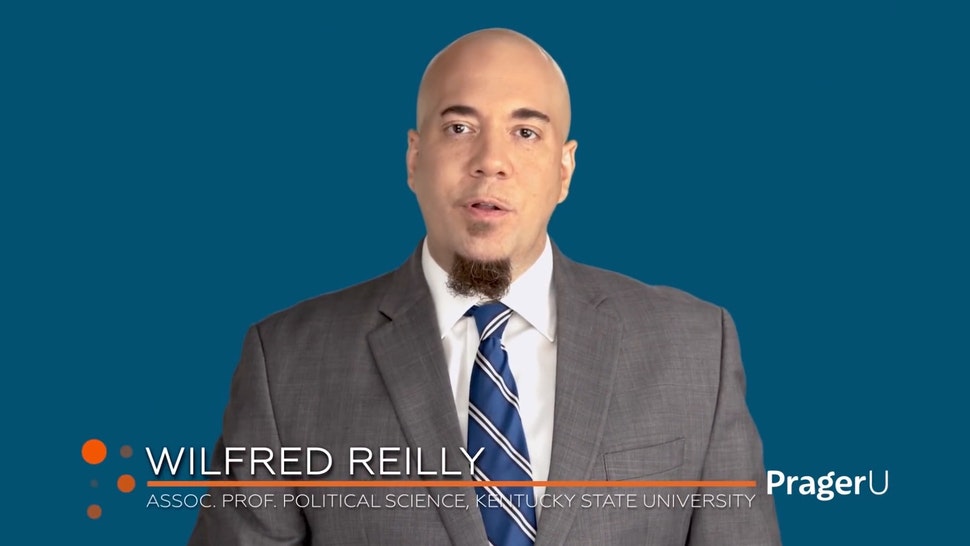(The Daily Wire) PragerU’s latest video features Wilfred Reilly, an Associate Professor of Political Science at Kentucky State University, who discusses some of what he describes as the fundamental flaws of the Pulitzer Prize-winning The 1619 Project, published by The New York Times in 2019. Despite sharp criticism among some prominent historians, the project has been heavily promoted by the Times and has even begun to make its way into some school curricula.
Related I Went To A Socially Distanced Drive-In Rave, And It Was A Depressing Dystopian Nightmare
by Staff Writer, November 30th, 2020
Reilly begins by countering The 1619 Project’s central thesis — that “The United States was founded in 1619, when the first slave was brought to North America” — with some glaring questions: “What happened to 1776? To July 4th? The Declaration of Independence? George Washington, Thomas Jefferson, and James Madison?”
In order to debunk the view promoted by The 1619 Project that “one of the primary reasons the colonists decided to declare their independence from Britain was because they wanted to protect the institution of slavery” and that “Out of slavery — and the anti-Black racism it required — grew nearly everything that has truly made America exceptional.”
Reilly looks at three of the major claims made by the project.
The first is the idea that preserving slavery was one of the primary motives of the American Revolution. In response, Reilly begins by discussing the reasons the Founders sought independence, which included “taxation without representation, conflicts over debts from the French and Indian War, and the Stamp Act.”
“Probably most important,” according to Reilly, “was the burning desire to be free.” Slavery, conversely, “was not under threat from the British,” and “the subject of slavery was hotly debated at the Constitutional Convention.”
The second claim Reilly addresses is that slavery supposedly made America rich. Reilly first acknowledges that “slavery made some Americans rich,” citing Eli Yale as an example. However, Reilly then posits that “the institution of slavery didn’t make America rich,” and that the system of slavery actually “slowed the economic development of half the country.”
After citing economist Thomas Sowell’s argument that “the South was an economic backwater,” Reilly then moves on to remind viewers that “the cost of abolishing slavery was enormous,” both in terms of dollars and human life. He then concludes by pointing out that, 200 years since the Civil War, “the population of the country has grown almost 900% and our national GDP has increased 12,000%.”
The third 1619 Project claim Reilly slams is the “more philosophical than scholarly” view that “racism is an unchangeable part of America,” suggesting that “the United States is an inherently racist country that can’t overcome its flaws.”
Reilly then presents multiple counter-arguments to this “pernicious” viewpoint. Despite the fact that “progress has not always been smooth,” he states that “America is the most successful multi-racial country in history, the only white majority country to elect a black President — twice.” He questions why “two million black Africans have come to America as legal immigrants — from countries like Nigeria — in the last 50 years, and have become one of the most successful groups in the country,” if America is truly an “evil, racist country.” Finally, he praises the multi-racial efforts made to advance the cause of racial equality.
Reilly ends by remembering “great black leaders of the past — Harriet Tubman, Frederick Douglass, Booker T. Washington, Martin Luther King,” none of whom “believed that racism was America’s defining characteristic,” he says. The flaws he listed, and others, says Reilly, is why a group of distinguished historians condemned The 1619 Project as “a displacement of historical understanding by ideology.” The famous civil rights leaders and the historians, Reilly concludes, were right.
Stillness in the Storm Editor: Why did we post this?
The news is important to all people because it is where we come to know new things about the world, which leads to the development of more life goals that lead to life wisdom. The news also serves as a social connection tool, as we tend to relate to those who know about and believe the things we do. With the power of an open truth-seeking mind in hand, the individual can grow wise and the collective can prosper.
– Justin
Not sure how to make sense of this? Want to learn how to discern like a pro? Read this essential guide to discernment, analysis of claims, and understanding the truth in a world of deception: 4 Key Steps of Discernment – Advanced Truth-Seeking Tools.
Stillness in the Storm Editor’s note: Did you find a spelling error or grammatical mistake? Send an email to [email protected], with the error and suggested correction, along with the headline and url. Do you think this article needs an update? Or do you just have some feedback? Send us an email at [email protected]. Thank you for reading.
Source:
https://www.dailywire.com/news/prageru-whats-wrong-with-the-1619-project

Leave a Reply